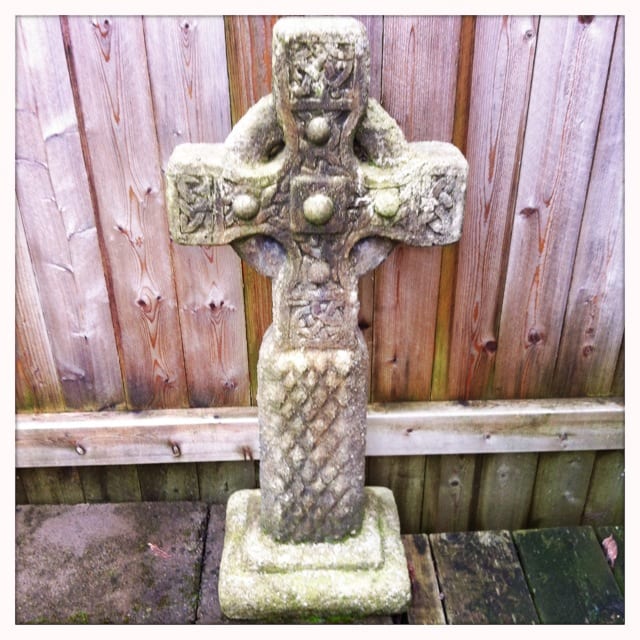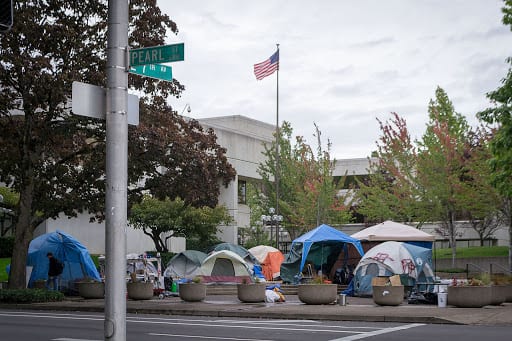I decided to take advantage of the Indian Summer we are having in the Seattle area today and finally pull some of the weeds in the yard. As I squatted in the dirt, my beloved hori hori (Japanese weeding miracle pictured above) in one hand and an enormous pile of dandelions and chickweed piling up next to me, the neighbor’s toddler began to scream. Great, gulping wails of sadness punctured every few sobs by a blood curdling shriek. My sequence of thoughts went a little like this:
Thank God that’s not my kid.
Poor dear. He sounds so sad.
I wonder what’s going on in his head right now to make those screams necessary.
Thank God my kids are too old for naps. I’ll bet she’s just put him down in his crib and left so he’ll sleep and he’s crying it out.
I wonder if she sits in the kitchen and cries like I used to.
And just like that, I was transported back to those incredibly lonely days of parenting a toddler. The days where I never really felt like I knew what I was doing and yet I had convinced myself that I had to present a confident picture to the world and my child. The days where I woke up determined to follow the parenting books and let her cry herself to sleep so she would learn to soothe herself and caved somewhere around minute two, going in to lay down with her and stroke her back and kick myself for giving her mixed messages.
I hoped that my neighbor didn’t feel angry or scared or frustrated. I hoped that she felt like she had a good plan and didn’t feel a searing pain in her core each time her baby cried so dramatically. I hoped she didn’t feel like this was more than she could handle.
————————————————————————————-
I remember visiting my grandfather the week after my high school graduation. He had been caring for my grandmother in their home as she struggled with Alzheimer’s Disease and was coming to the point where he would have to make a decision about whether or not to move her to a nursing home. I was there to party since he lived in Southern California near all my cousins and he had an extra bedroom. Thanks to my grandmother’s dementia, he also had an extra car I could use.
I was shocked at my grandmother’s decline. She was confused almost all the time and prone to wandering off for hours on end. For someone who could barely remember her name, much less her address, this was alarming to say the least. My grandfather had been reduced to a prison warden in his own home, watching his wife of 50 years waste away physically and mentally and having to scratch all of the grand retirement plans they had made together off the list of possibilities. He was sad and a little bitter. One night as we sat chatting after dinner (grandma was asleep on the couch in the living room clutching a bottle of Butterscotch schnapps), he talked about his frustrations. I didn’t know what to say. I had no life experience to draw from and I was at a complete loss. I opened my mouth to say I don’t know what and he cut me off.
“Don’t you dare say what your mother did. That God never gives us more than we can handle. That’s a load of bullshit! This is more than I can handle and I don’t believe that God stuff. I only went to church because it made your grandmother happy!”
I was stunned. I hadn’t been anywhere near about to say what he anticipated, but I suspect that what I was going to say would have been as cliche and useless as what he thought I would say. I simply put my hand on his freckled arm and squeezed, my eyes full of tears.
————————————————————————————-
And so, knees in the dirt, I contemplated that platitude – that we are never given more than we can handle – and found it lacking. I can count many times in my own life where I felt overloaded with grief or responsibility or pure ignorance in the face of obstacles. Everyone I know has felt that way multiple times.
I decided that, instead, we are often faced with more than we can handle and maybe this is by design. I know that when I find myself in that position what I have learned is to ask for help. For most of my life I thought that asking for help was the definition of weakness and was determined to figure things out on my own. The messages I got from my parents and the media and society as a whole informed me that independence is an important trait. That people who do things on their own are revered and praised. I was in my 30s before I realized that the only thing independence got me was isolation and a deeper hole. I felt lonely and less capable than ever when I tried to handle everything by myself and, while I may have eventually found my way out of that hole I was in, I didn’t do it in the most efficient way – often reinventing the wheel as part of my process – and I was bloody exhausted by the time I got out.
Human beings are social creatures. We draw strength and information from each other. Even those individuals who may be examples of pioneering spirit and a can-do attitude didn’t truly do anything on their own. They built on the successes of others who came before them. Or they benefited from the support and love of their family and friends. Maybe being routinely faced with more than we can handle is the Universe’s way of ensuring that we continue to find ways to work together, to ask for assistance.
And when assistance isn’t possible, perhaps this overwhelming feeling serves another purpose – innovation. For people who are struggling with lack of finances or mental illness or disabilities for which there is too much bureaucracy or too little empathy to find help, maybe the mounting troubles prompt action. No one person is going to effect policy change, but if your difficulties spur you to action, to build community around your cause in an effort to make a difference, to rally voices loud enough to be heard by those in power, I’m not going to say it was “worth it,” because, honestly, we all wish we could simply sail through our days with fewer challenges, but maybe it serves a purpose.
Some of my closest friendships have been forged through the process of asking for help or being asked for help. The people I most trust are those who recognized when I was in trouble and offered a hand without judging or mocking me. And so, in that light, maybe I can appreciate (just the slightest bit) being given more than I can handle on occasion, if only to remind me that I should reach out and ask for help. If only to help me recognize how much farther I can go when I am supported by others, buoyed by their wisdom and love.








"I decided that, instead, we are often faced with more than we can handle and maybe this is by design." I agree. I'm sure you can compassionately communicate to your neighbor that you really struggled when your kids were that age, then see if she wants/needs to talk.
I love this Kari. It resonates with me right now in a way that astounds me. The isolation that you speak of (no, I'm not a parent) from trying to get through difficult times by oneself rings very true. Thank you for this. Consider the myth debunked.
Dear Kari, this reflective posting touched me deeply and made me think of all the times I've needed to ask for help. And of how when life was so terrifying because of Meniere's it took a friend's straight forwardness to help me realize I needed to ask for help and to accept that I wasn't in control. And that made all the difference.
I wonder sometimes if you've ever thought of publishing a book of reflections. You are such a thoughtful/thought-filled person who lives the examined life with grace and fortitude. Your words so often are a clarion call to me to consider the way I live. Thank you. Peace.
Love.
another wonderful and insightful post. i always go on a healing journey when I read your essays. Im so inspired by you!
Genius. Seriously. Thank you.
I love this. I love the reflection and sentiment. Wow, can I relate, too. I'm a SAHM of a 6 month old and 2.5 year old and when my kids scream, I always second guess myself.
It's also really nice to hear that those are your thoughts when you hear a crying toddler. I always worry that I'm being judged by my neighbors when my son has a temper tantrum.
As a believer, I would like to mention that the "God doesn't give you more than you can handle" quote is actually a misquote of "if God brings you to it, he'll bring you through it" which is paraphrased from 1 Corinthians 10:13. I believe God uses others to get us through things, but we still have to ask and I agree with you that it's by design.
Thank you for this post. It's what I needed to read today 🙂
Yes. Just yes to all of this.
I have such a hard time asking for help, but when I do it, I find that I am blessed. It is a lesson I'm still learning.
What a beautiful reflection.